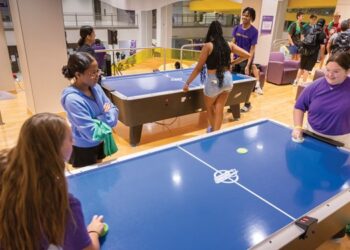The expert advice to answer your most pressing questions. This month, Alison Cross, director of recreation at Virginia Tech, shares advice on wellness.
How do you work to promote collaboration on wellness between departments across campus?
AC: I really try to get to know the people in other departments. In the summer, a lot of the counselors from the counseling center will come in and exercise with us over lunch — just for us to get to know each other. And then over a workout we might develop a brand-new program that is integrated and is a high-impact experience for students. Then I try to have good relationships with all of the directors in the division and get to know them so that we have contacts and an easy bridge that we can build upon. Things like that help with us being integrated.
What is an example of one of the wellness programs?
AC: Our HEART Program is an example of an integrated approach. It stands for Healthy Eating Assessment and Referral Team. We have a case manager, who is one of the nurses in our health center, then we have a doctor, our dietitian, a counselor and a rep from Rec Sports who is an exercise physiologist. We see students who have eating disorders and who are voluntarily asking for assistance. They want to be referred to whatever resources they need, so they can build their support system in order to stay in school here. Oftentimes we will make the recommendation that they take a leave of absence from Virginia Tech and go into an inpatient program, but if they are at a place where we think they can stay, then we will work with them through that referral team.
Do you think that more schools are starting to incorporate wellness programs?
AC: I definitely hear a lot of talk. It does seem like people are trying to figure this out. Where does recreation fit? Depending on university structure it looks different for many different universities. But from the recreation point of view, I see that as our motivation. I think that we see where students are struggling — with their confidence, coping skills, relationships, etc. We see the need to make sure that our resources and facilities are available to students, because we know they are not thriving in these areas.
What advice would you give to other recreation professionals?
AC: There is a lot of data out there that definitely helps catapult initiatives that might be outside of our core programs. Finding that data and being able to study it so you can have good strategies in mind. Take risks and financially plan for what those little risks are going to be. Be smart about when and where to take risks. When a program works, then you can try and find a way to sustain it. Let people within the department, the ones that are really working with students day to day, really develop those programs, or have students develop them with you. Listening is also important. A lot of times we will hear what our presidents or vice presidents at universities are saying, so we are listening up, but we need to make sure we are listening down and staying with the students to develop things.










